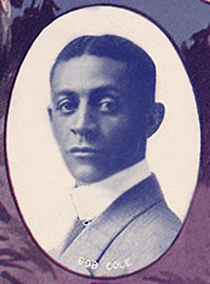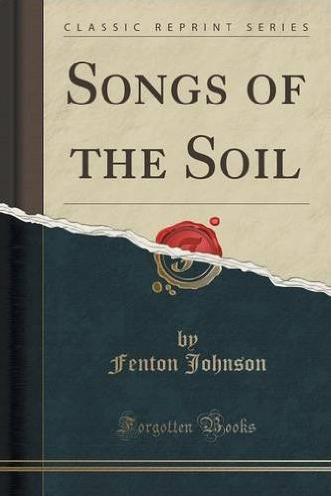Fenton Johnson began writing as a Chicago public school student, as early as the age of nine, and before his career had ended would establish himself as an important and innovative voice in literature, particularly for his poetry. Johnson was born in Chicago, the son of a railroad porter, and was educated in America’s finest educational institutions—University of Chicago and Northwestern University as an undergraduate, and then Columbia University as a graduate student.
Johnson self-published the first of three poetry volumes in 1913, in which he gave early evidence that he would become a powerful voice in exploring the African-American experience. Before that time, Johnson had already written several plays, and would add a collection of short stories and then essays to his oeuvre. He also founded several literary magazines, The Champion in 1916 and The Favorite Magazine in 1918. All of Johnson’s books and magazine publications were self-financed.
Johnson distinguished himself, though, in the teens and early twenties. According to editor Abraham Chapman, who included eight Johnson poems in his Black Voices: An Anthology of African-American Literature, “From beginnings with verse in conventional forms and often trite in content, Fenton Johnson became one of the very first Negro poets to turn to the revolutionary ‘new poetry’ movement in America. In 1918 and 1919 he published poems in Poetry magazine and Alfred Kreymborg’s Others, where he appeared along with William Carlos Williams, Wallace Stevens, and Marianne Moore. He never became a major figure, but he cultivated his own distinctive voice and a fatalistic, nihilistic vision of life which was very rare in American literature.”
Johnson’s magazines sought to bring about racial harmony and reform in society, but his poems were notable for despair about the conditions for Blacks in America.
His most famous poem, “Tired,” begins, “I am tired of work; I am tired of building up somebody else’s civilization.” It also includes the line, “Throw the children in the river; civilization has given us too many. It is better to die than to grow up and find that you are colored.”
The J-Rank Encyclopedia notes that, “Johnson was part of the new imagistic poetry of the early twentieth century, which had Midwestern and specifically Chicago roots.”
Indeed, Johnson used Chicago as the setting for a good portion of his work, such as “Aunt Jane Allen,” which is set on State Street in the Bronzeville neighborhood, and “A Negro Peddler’s Song,” which is patterned after a song sung in a Chicago alley. Even in A Wild Plaint, a recently found unpublished Johnson manuscript in the form of 20-year-old Chicagoan Aubrey Gray’s diary, he details the sites and sounds of his city, and the plight of Black Americans. The diary concludes with Gray’s suicide, specifically a note that says, “due to this color-prejudice… that I do what I am doing.” Though Johnson spent the great majority of his life in Chicago, his work is credited as a forbearer to Harlem Renaissance writers like Langston Hughes.
The Johnsons were one of Chicago’s wealthiest Black families—his father owned their State Street home, a rare accomplishment at the turn of the 20th century. Johnson’s uncle, John “Mushmouth” Johnson, amassed a fortune running a gambling house and controlling Chicago’s policy racket. Arna Bontemps, a friend of Johnson’s until his death, wrote that he was “a dapper boy who drove his own electric automobile around Chicago.” But the Chicago boy who went to Englewood High School and then Wendell Phillips High School, whose family had status and financial security, did not see his life as blessed or lucky. In his essays and poetry, Johnson alludes to a bad ending for his father, and his uncle’s demise was also dramatic. The body of his work suggests that being Black, in that time, in that place, ensured such misfortune.
While many scholars consider Johnson a minor, though notable poet, his widespread and continuing inclusion in important literary anthologies suggest his legacy is lasting. In his lifetime, Johnson saw the likes of James Weldon Johnson, Harriet Monroe and her colleague Alice Corbin, and Countee Cullen choose his poems for inclusion in their anthologies. After Johnson’s death, he would continue to be widely published in anthologies of Black literature and poetry, with luminaries such as Henry Louis Gates Jr. and Bontemps selecting his work.
The language poet, Ron Silliman, in his 1987 collection of critical essays The New Sentence, pointed specifically to Johnson as the first American author to introduce “prose poem with a clear, if simple, sentence:paragraph relation.” Silliman was particularly enthralled by Johnson’s “The Minister,” which he argues, is the “first instance in English of a prose poem which calls attention to a discursive or poetic effect.” By this, Silliman means to say that Johnson’s prose poetry was perhaps one of the very first to expand what poetry might look and sound like—here no longer conforming to meter or rhyme but a new repetitive logic, the sentence itself. As Silliman notes in his essay, Johnson’s poetry effectively points the way to Williams and Gertrude Stein amongst others, who historians and critics alike consider to be some of the most important American authors of any century.
It is really no small thing that Johnson’s name would be mentioned in the same breath as these modernist poets. In the 1920s and 1930s, Johnson was already established as one of the most promising young poets of Black or White America. He had appeared alongside Carl Sandburg in Marianne Moore’s The Little Magazine, a number of times in Poetry magazine, and more often still in Kreymborg’s Others. Indeed, by 1930, Kreymborg, one of the most influential editors of the period, would include Johnson in his seminal anthology Lyric America. On Johnson, Kreymborg shared Silliman’s reverence, calling him “the first radical poet.” Perhaps most importantly, five of Johnson’s poems were included in James Weldon Johnson’s Book of American Negro Poetry. This anthology was the very first dedicated to Black poets and remains one of the most important poetry anthologies in all of American literary history.
read less









